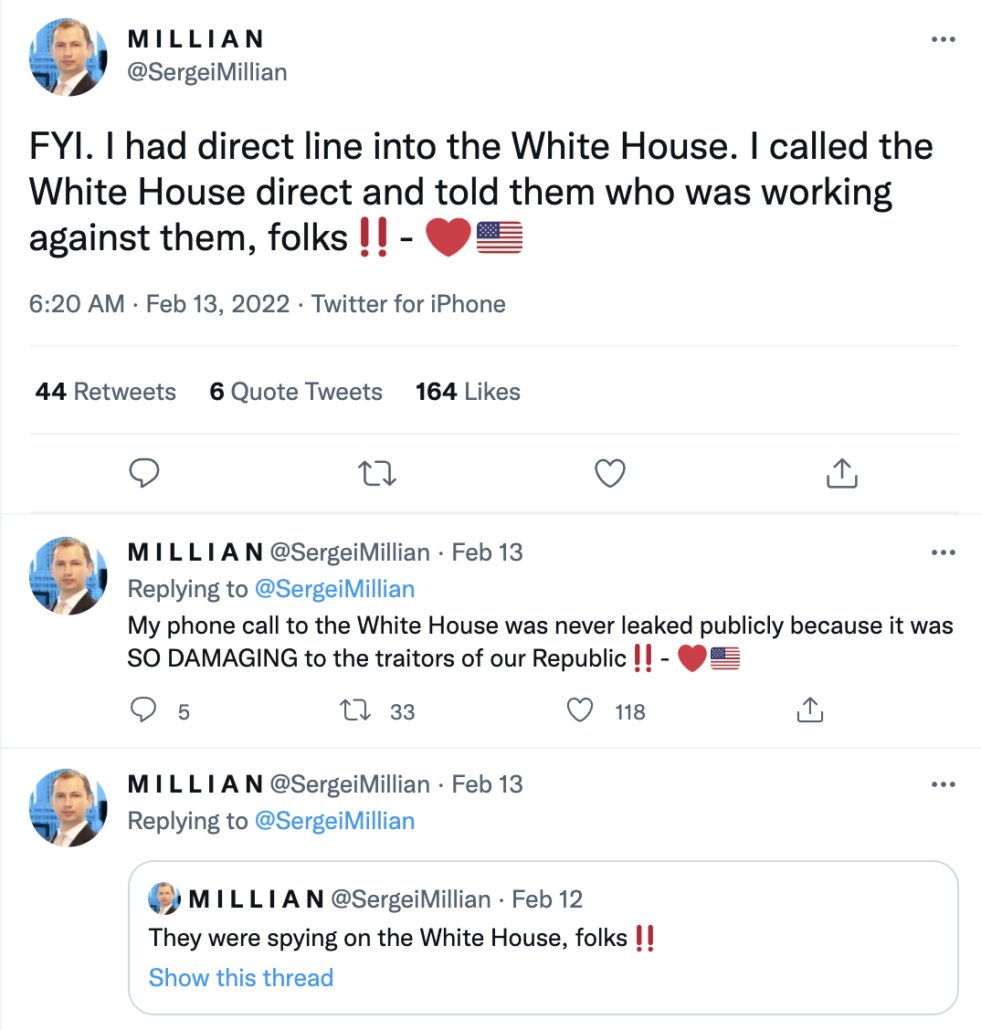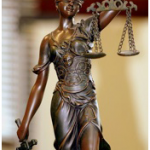John Durham Twice Misread Steele Dossier Sourcing to Invent a Partisan Claim
To understand what a train wreck FBI Supervisory Analyst Brian Auten was for John Durham’s case yesterday, let’s start with the fact that, on redirect, Durham lied about — or maybe just doesn’t understand — what Igor Danchenko said to the FBI about Sergei Millian in January 2017. He did so when trying to get Auten to agree that Millian couldn’t have called Danchenko because he’s a Trump supporter.
Q. So would you find it peculiar that somebody who had never spoken to Millian, Millian never spoken to him, would be telling somebody he doesn’t know about a, quote, well-developed conspiracy of cooperation, between The Trump Organization and Russian leadership?
A. I mean, I would say that is peculiar, yes.
Q. That is very peculiar, right?
A. Yes.
Q. Almost unbelievable, wouldn’t you say? A. I don’t know if I would say “unbelievable,” but I would say “peculiar.”
Durham, of course, was citing from the Steele dossier’s report attributed to Sergei Millian, which Danchenko didn’t write and claimed not to have seen before it was published. In fact, one of the reasons why the FBI found Danchenko was credible is that he didn’t try to protect Steele. Danchenko implied that Steele exaggerated his report on Millian, which instead amounted to a 10 to 15 minute phone call.
More importantly, Danchenko claims that he didn’t tell Steele that Millian had described a “well-developed conspiracy of cooperation.” On the contrary, Danchenko told the FBI that Millian had told him there were ties between Russia and Trump, but there was “nothing bad about it.”
[The Primary Sub-source] recalls that this 10-15 minute conversation included a general discussion about Trump and the Kremlin, that there was “communication” between the parties, and that it was an ongoing relationship. (The Primary Sub-source] recalls that the individual believed to be [Source E in Report 95] said that there was “exchange of information” between Trump and the Kremlin, and that there was “nothing bad about it.” [Source E] said that some of this information exchange could be good for Russia, and some could be damaging to Trump, but deniable. The individual said that the Kremlin might be of help to get Trump elected, but [the Primary Sub-source] did not recall any discussion or mention of Wiki[L]eaks.
If Danchenko is to be believed — and the FBI long believed he was — Danchenko interpreted Millian’s comments as helpful for, not harmful to, to Trump.
And that’s important because a fundamental article of faith, as far as John Durham goes, is that someone’s political party dictates all regarding sourcing. Millian couldn’t have called Danchenko, in Durham’s book (even though a whole ton of evidence was presented that he could have), because he was a vocal Trump supporter.
Q. Right. Did you find it at all peculiar — you and your colleagues find it at all peculiar that somebody who is an avid Trump supporter would be calling somebody he had never met and talked to before to provide negative information about the Trump campaign?
A. I would say, in this case, you don’t know.
Durham needs the Millian report to be negative because he needs to find a partisan angle to everything in the dossier, but he simply invents what Danchenko — as opposed to Steele — claims Millian said.
By comparison, Durham suggests that Chuck Dolan’s role in potentially sourcing the arguably most accurate report in the dossier (it’s unsurprising it was accurate because it was based on press coverage) is suspect because of Dolan’s role in Democratic politics.
BY MR. DURHAM: Q Do you recall whether or not when you were chatting with Mr. Danchenko in January 2017 if he indicated that the work he was doing with Christopher Steele was an important project for him?
A I don’t know if he characterized it as an important project for him, but he characterized it as a project that he was very busy with.
Q With respect to the second part of that sentence, “…and our goals clearly coincide,” in context Mr. Danchenko’s and Mr. Dolan’s goals?
A That is how I would read that.
Q Would it have been of value to the FBI to know that Mr. Danchenko’s goals and Mr. Dolan’s goals related to the Trump campaign coincided?
[snip]
Q And with respect to goals coinciding, let me ask you this: Did you determine whether or not Mr. Dolan had any particular partisan persuasion?
A Yes.
Q And what was that?
A Democratic.
Q And how deeply involved in democratic politics was Mr. Dolan, if you know, based on your own personal participation in the investigation?
MR. ONORATO: Objection to relevance.
THE COURT: I’ll let him answer. Go ahead.
A I understand he worked with various aspects of democratic campaigns over the years.
Q And when you say over the years, was it like two or three years or a longer period?
A My recollection is it was longer.
Q Much longer?
A For a while back. I wouldn’t be able to actually specify how long back.
Q In any event, it would have been valuable for you to know that Mr. Danchenko’s goals coincided with Mr. Dolan’s goals, correct?
Note, Durham doesn’t consider — apparently doesn’t even conceive of the possibility — that Danchenko would have told Dolan their goals coincide as an appeal to Dolan’s partisanship even if he himself had none.
Steele (and therefore Danchenko) was first paid to dig up dirt on Paul Manafort by Oleg Deripaska, someone working to get Trump elected, and in fact one of the most important new details of this exchange is that Danchenko prefaced it by referencing asking someone much earlier, in May — possibly during the time when Deripaska was still paying the tab — for dirt on Manafort. With regards to Manafort, it’s not clear Danchenko would have reason to distinguish between the two projects paying to develop dirt (and he didn’t know precisely who was paying either time). He wanted dirt and the record shows that even someone closely tied to Manafort, Deripaska, was willing to pay for that dirt.
In any case, Durham makes a materiality claim that it was really important for the FBI to know Dolan’s partisan leanings.
Q. But for the FBI’s purposes in evaluating 105, Government’s Exhibit 112, was of significance this reportedly was coming from, quote, an American political figure associated with Donald Trump and his campaign, closed quote?
A. Yes, that was important.
Q. So with respect, then, to that information, that person that was providing the information, was Donald — was Charles Dolan, would that be import to you?
A. Yes, that would be of import.
Later, to play up the import of Dolan’s politics, Durham again misreads the dossier and in the process, misstates his entire case. He implies that the FBI, in assessing Report 105 — which, as Danchenko’s lawyer got Auten to agree, “has absolutely nothing to do about collusion in Russia, which is the whole point that Crossfire Hurricane was opened,” but which is Durham’s single piece of evidence that the Steele dossier was sourced to Democrats — should have known that a source described as “an American political figure associated with Donald TRUMP and his campaign” was actually a Democrat.
Q. And would it be of import to you that Mr. Dolan was not somebody who was an American political figure associated with Donald Trump and his campaign but, in fact, was a Democratic operative for a long period of time? Would that have been significant to you?
A. Yes, we were interested in all of the —
Q. Right.
A. — sources.
Q. So if you knew that that was the case, it wasn’t some Republican insider or some associate of Donald Trump’s, what, if any, impact did that have on your evaluation of the validity and credibility of the information that’s being conveyed in these dossier reports?
A. Well, it helps — it would have helped to understand kind of accuracy and things of that sort for the dossier reports.
Except that, once again, that’s not what the sourcing indicates. If Durham’s allegations are correct and this came from Dolan, it amounts to Danchenko sourcing something Dolan attributed to a Republican friend of his. If this claim is inaccurate, it’s not because Danchenko lied, it’s because Dolan did.
That is, Durham’s problem isn’t that Dolan is a Democrat. It’s that Dolan — his own witness — is an admitted fabricator.
And John Durham is trying so hard to invent partisanship rather than Russian rat-fuckery, that he doesn’t understand he’s impugning his source, not Danchenko.




One does wonder if the goal of this is to obtain a conviction, or just to generate more headlines like this from the Sussmann trial (I’m avoiding pasting a link to foxnews dot com, but this part of the URL for those who are interested, and it’s the same as the headline):
despite-acquittal-durham-trial-of-sussmann-added-to-evidence-clinton-campaign-plotted-to-tie-trump-to-russia
In the bubble, the point isn’t to win the case (although I’m sure they’d like to win the case, as that would help the narrative), it’s to fuel the narrative of the Evil Clinton Hoax.
Propaganda value is 90% of this undertaking’s worth, which may just be a reflection of the maxim that 90% of everything is shit
John Durham is the pathetic emblem of a long and catastrophic enterprise. Cloaked in self-righteousness and vengeance, he alone remains on the legal battlefield to fight what began as a foreign adversary’s disinformation campaign, got laundered into Trump’s “Russia Hoax,” which itself got washed in the blood of the Lamb to become a sacred crusade by Bill Barr and his disciple Durham.
Like a Spenserian knight lost in the woods without his mount, Durham babbles. And babbles. The only thing giving him oxygen is what Jonathan so nicely called “fox news dot com.”
That wrong people are being prosecuted for the wrong things does indict Durham to a degree, but it is of not consolation to Americans regarding the totality. It means that if Dolan (and/or others as well) should have also or in lieu of been prosecuted but otherwise walks then justice doubly will not have been served: Danchenko perhaps unfairly targeted and the real perpetrators getting away. A part of this is Durham’s to own, but also a part is fact that all of this is playing out some five years later than it all should have. With Sussman, and Danchenko, and Dolan et. al., offending statements in question being exploited now to date back some five years or more.
A cautionary tale to the way all of these various investigations played out starting with 2015 shows that wheels of justice grinding too slowly means in some cases they’re not going to grind at all, or grind wrongly.
Perhaps the lesson we can take away from all of this is perfectly explained in the old adage, “Justice delayed is Justice denied.” As far as I can see, the much mentioned Barr/Durham investigation, far from being a huge revelation of wrongdoing by Clinton and the DNC, has instead proven that it was nothing more than a ploy used to denigrate their political opponents. Sadly, because of the time it took to reveal that fact, Trump and his many supporters have used the existence of the investigation for years to justify their lies. Meanwhile, many of Trump’s base will either never hear of the true outcome, or, because it ended with a whimper instead of a bang, choose not to believe what’s reported. In the words of Donald Trump, “Sad.”